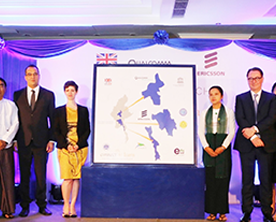Ericsson announced on January 13 that it has made significant progress as reached 21,000 students in its Connect to Learn project in Myanmar. It is set to improve the learning outcomes of more than 21,000 students in the country by 2017. Connect to learn is a public-private partnership that involves the use of ICT solutions to promote universal access to quality secondary education in developing countries and has launched in 2010 by the Earth Institute of Columbia University, Millennium Promise and Ericsson.
The Myanmar Connect to Learn project firstly announced in 2014 and is the largest of its kind undertaken by Ericsson. 155 teachers from 31 schools have successfully completed the first stage of their training, which will now allow them to begin integrating ICT into their classroom teaching, and use the internet to enrich the learning experience of students.
In addition, the second batch of remaining 300 scholarships were awarded today to deserving girl students from Mon and Bago in Myanmar, bringing the number of total scholarships awarded to 600. Connect to Learn will improve literacy in both the local language and in English, as well as improve numeracy for over 21,000 students in total in Myanmar, by early 2017.
“Connect to learn in Myanmar is an example of how private-public partnerships work well to bring positive developments in society. While Ericsson is leading the initiative, our partners all tirelessly contributed their expertise and resources to bring 21st century education to Myanmar.” said by Mats H Olsson, Senior Vice President and Head of Asia-Pacific, Ericsson. In addition, Olsson added that “As the population of Myanmar begins to enjoy the benefits of mobile communications, Ericsson’s goal is to ensure that Myanmar’s youth are supported to reach their full potential,”
The project was largely made possible through a strategic partnership between Ericsson and the UK Department for International Development’s (DFID) Girls’ Education Challenge. Since the program began in Myanmar in June 2015, it has supported the development of ICT skills in teachers in 31 schools in Mandalay, Mon and Bago states. Five teachers and one headmaster from each of the 31 schools have been trained. In addition, one township Education Officer from each township is being trained to support the program within their community. Ericsson and its coalition of partners for the Connect to Learn project leverage the strengths and contributions of each collaborator. For example, the UK Department for International Development (DFID) provides project funding, UNESCO provides teacher training and mobile technology-based educational programs on English language and life skills and the Earth Institute manages the student stipend and school grant component, as well as conducting implementation research at the schools. Finja Five provides child-friendly computing solutions, while EduEval Educational Consultancy conducts monitoring and evaluation. Qualcomm Incorporated, through its Qualcomm Wireless Reach™ initiative, also provides funding and the program utilizes mobile devices enabled by Qualcomm Snapdragon processors. Mobile network operator Myanma Posts and Telecommunications provides SIM cards for the schools. The project also receives extensive support from the Ministry of Education and the Ministry of Communications and Information Technology in Myanmar.
DFID is providing approximately £3.7 million (approximately US$ 5.4 million) in funding, which will be matched by the partners through cash and in-kind contributions DFID’s Head in Myanmar, Gavin McGillivray, said “The UK government has made a substantial commitment to supporting education in this country to help ensure that all children have the opportunity to maximise their potential. We are excited by the innovative approaches that Connect to Learn is piloting – and hope that the initiative will help inform the way the country modernises its schooling more broadly – with positive impacts for the learning, health and wellbeing of girls as well as for their families and communities.” Sardar Umar Alam, Head of UNESCO Yangon, said, “Being the first-of-its-kind ICT for Education project in Myanmar, UNESCO tailor-made basic ICT skills training, including the use of mobile broadband networks and learning applications, for selected teachers in the project schools. Additional training is planned to further develop the skills of teachers to integrate ICT and apply multimedia in their teaching and learning. We believe the training will not only improve quality of education in classrooms, but will also enhance overall innovation in teaching and learning with this empowerment of teachers in Myanmar.” According to the World Bank, only 54 percent of secondary-school aged children enrolled in schools in Myanmar. This is where public-private partnerships like Connect to Learn can dramatically improve access to quality education. Ericsson also takes an active role in boosting access to broadband services for the general population of the areas in which Connect to Learn is deployed.










